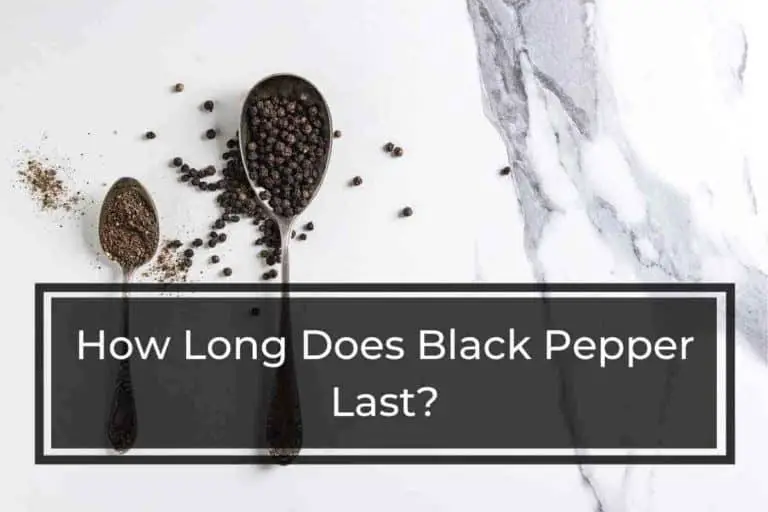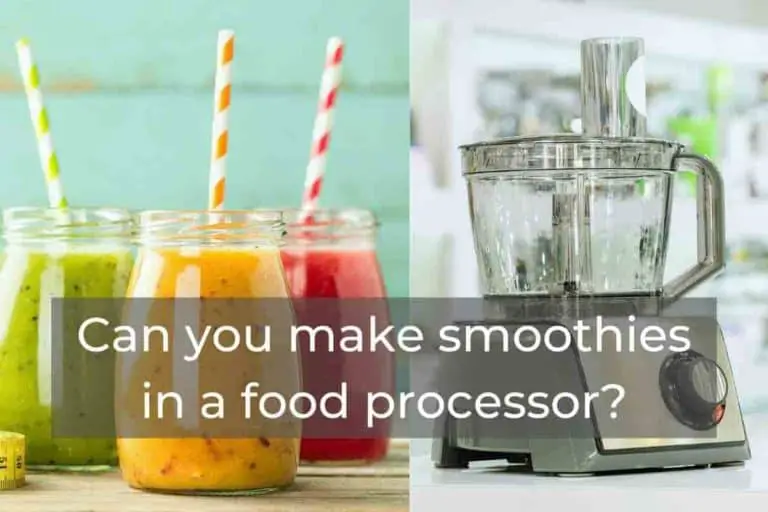Why Do Cakes Shrink After Baking? [Here’s the Answer]
Baking cake is an art, although baking is pretty easy sometimes the end product will not come out what you had wished. During baking, many unusual things can happen, and the reason is usually much simpler than we expect. Perfectly baked cakes are always a hit, but when the cake shrinks after baking, it is critical to understand why?
Why do cakes shrink after baking?
Several factors can cause cakes to shrink as they cool, including an incorrect ratio of gluten to eggs, too much leavening agent, an overheated oven, overmixing the batter, under baking, and fast and rapid cooling. However, you can overcome these difficulties and bake a perfect cake with the right intervention.
When a cake shrinks after baking this is a sign that the cake was overbaked. Homemade cakes may rise while baking but shrink once cooled. Because when the cake is in the oven, it produces carbon dioxide due to the ingredients present in it – baking powder or baking soda.
This carbon dioxide cause bubbles to develop, and your cake will rise. But as you pull the cake out of the oven, no carbon dioxide is produced, causing the bubbles to shrink.
If you want to learn more about why do my cakes shrink after baking and what causes the cakes to shrink after baking, and how to prevent the cake from shrinking then keep reading below.
If you are interested in checking out the best baking accessories, you can find them here.
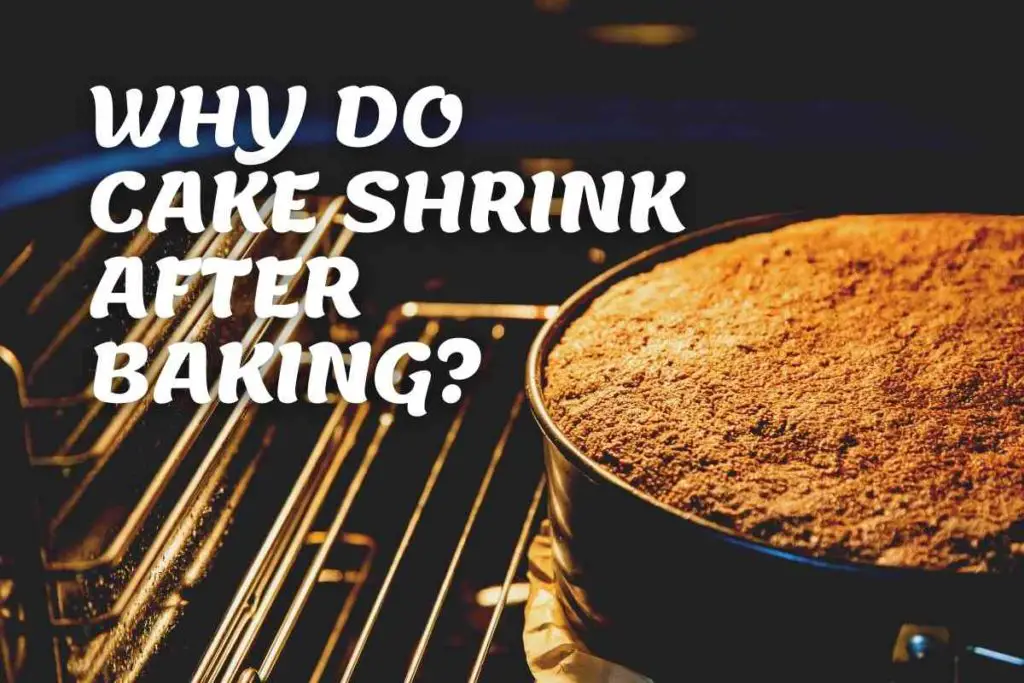
Why Does My Cake Shrink After Baking?
The cake mixture contains leavening agents (baking powder and baking soda). These agents are the key ingredients responsible for the cake to rise. The rise of the cake develop from two methods:
- Leavening agents produce carbon dioxide that allows air pockets to develop in the cake. These pockets support the dome of the cake.
- Air trapped in the egg whites mixture during the beating.
The eggs and flour proteins set and hold the air bubbles as they are in the oven. The ratio of gluten to albumin is essential in determining the strength and firmness of the cake.
When you pull out your cake from the oven, a lot of processing is still going on – the eggs and flour are still cooking, and the water is escaping from the cake.
So, why did my cake shrink?
As moisture leaves the cake, the cake volume decreases. The air pockets formed and collapsed. And not much air is trapped in the cake to replace the volume lost. Ultimately your cake shrinks in size. Shrinking most commonly occurs in the middle of the cake because the cake will still be softer there than on the edges.
You also can check out my article on how bakeries maintain cake freshness, to learn more about storing and keeping cakes fresh for a longer period.
Reasons for Cake Shrinkage:
- Overmixing: When the batter is overmixed, the gluten in the flour can become too developed, causing the cake to shrink as it bakes.
- Overbaking: If a cake is baked for too long, the heat can cause the structure of the cake to break down, leading to shrinkage.
- Underbaking: On the other hand, if a cake is underbaked, it can also cause shrinkage as the cake may not have set properly.
- Temperature fluctuations: Sudden temperature changes can also cause cakes to shrink. If a cake is taken out of the oven before it has cooled completely, it can collapse and shrink.
What Causes The Cakes To Shrink After Baking?
When a cake shrinks after baking, this is a sign that it is overcooked. What causes a cake to shrink after baking, the following problems can cause your cake to collapse:
The Cake Structure Is Not Firm:
Baking cakes lies in the delicate balance of baking your cake slowly so that air pockets will develop in the batter but fast enough to allow the cake to turn solid before the bubbles shrink.
Bubbles are trapped in the batter by two ingredients. The first one is the gluten of the floor, and the second is the albumin of the eggs. So, if the structure is not firm, your cake will come out flat.
Under-Baking:
If your cake is not thoroughly baked, it may shrink. If eggs and flour in the cake do not set completely, then the air pockets, upon which the cake’s dome stands, start to shrink down, and the cake will fall. In this case, you should bake your cake longer to prevent this problem.
Fast Cooling:
When the cake comes out of the oven, it is still soft and quite delicate to handle. Only after cooling at room temperature, the cake will develop its full strength. If you cool your cake too quickly, the structure will crumble, and your cake will fall out.
Why Did My Cake Shrink After Taking It Out of the Oven?
There are several reasons why a cake may shrink after being removed from the oven. A probable explanation is that the cake was underbaked, causing it to collapse as it cools.
It is also conceivable that the cake was taken from the oven too quickly, which can result in shrinkage. Moreover, if the cake was not thoroughly chilled before being removed from the pan, it may also shrink.
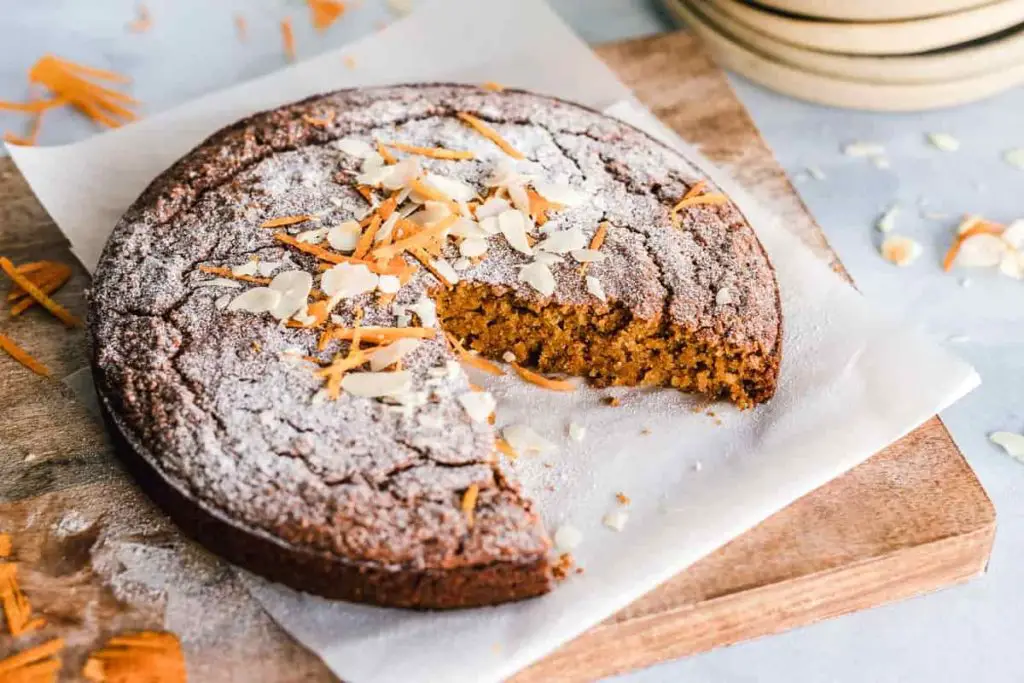
Why Do Cakes Fall When Cooling?
Cakes fall when cooling because the leavening agents (baking soda or baking powder) stop working once the cake is out of the oven.
The leavening agents produce carbon dioxide gas, which helps the cake to rise. Once the cake is out of the oven and the temperature drops, the leavening agents stop working, and the cake starts to collapse.
So, why my cake shrink after baking?
Another reason cakes fall when cooling is because the egg whites start to solidify. Egg whites are full of protein, and when they are heated, the proteins unravel and start to form new bonds with each other.
This makes the egg whites firm and gives the cake structure. However, when the cake cools down, the egg whites solidify and can cause the cake to collapse.
A third reason cakes fall when cooling is because the sugar in the cake starts to crystallize. Sugar is a molecule that likes to be neat and orderly. When the sugar molecules in the cake are heated, they become disordered and start to form random bonds with each other.
However, as the cake cools down, the sugar molecules start re-ordering themselves and forming crystals. This can cause the cake to become dense and heavy and can cause it to collapse.
Why Is the Top of My Baked Cake Sticky?
The top of your cake may be sticky for a few reasons. If you’ve used too much sugar, the cake will be sticky. Or, if the cake isn’t cooked all the way through, the top will be sticky.
To prevent your baked cake from being sticky, you should use a little less sugar than you normally would. If your cake is too dry, you can add a little more butter. If your cake is not cooked all the way through, you can put it back in the oven for a few minutes.
Why Does My Cake Sink in the Middle?
The most common reason for sinking cake from the middle is that the cake was not cooked evenly. This can happen if the oven wasn’t preheated properly, the cake was placed in the oven on an uneven surface, or if the oven door was opened too frequently while the cake was baking.
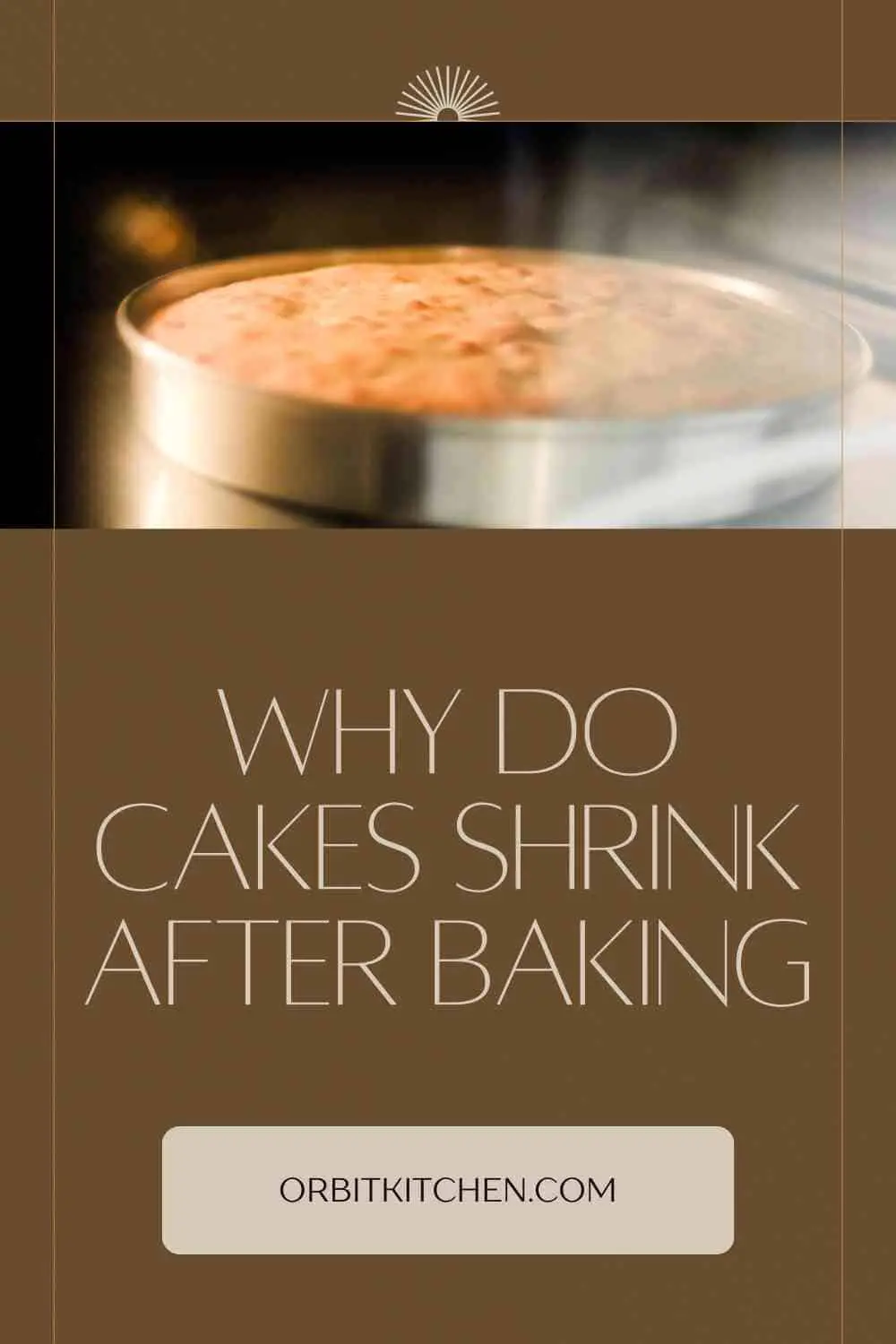
How Do You Know If Your Cake Is Done Baking?
The most common reason why the cake shrink is because a firm structure required to support the cake is not developed.
So, you need to bake your cake thoroughly to avoid this issue. Following are the ways to check if your cake is baked thoroughly:
Skewer Test:
It is the most common and easiest way to check whether the baking process is complete or not. Poke a skewer or toothpick in the center of the cake. If it comes out clean, the cake is made. Otherwise, it still needs cooking.
Tap Test:
Gently tap the top of the cake with your hand. If the cake bounces bake, then it has taken on a certain firmness and strength. But if depression develops, then the cake is not completely baked.
Edges must Pull Away From The Pan:
If the edges are nicely golden brown and quickly leave the pan, the cake is done baking.
Use a Thermometer:
If the internal temperature of the cake is 100°C, it means it is done baking. Use a thermometer to check the temperature.

See this Thermometer at Chefstemp here.
How to Prevent Cake from Shrinking After Baking?
There are a few things you can do to prevent the cake from sinking after baking. Make sure you use the correct amount of leavening agents, such as baking powder or baking soda. Sift your dry ingredients together before adding wet ingredients.
Be careful not to overmix the batter and bake the cake at the correct temperature for the specified amount of time.
How to Avoid Cakes from Shrinking As They Cool? Dos and Don’ts:
Do you want perfectly risen cakes that retain their shape even after cooled? So, how to prevent cake from sinking after baking?
Here are a few tips that will give you the best results:
Cool Slowly And Gently:
Cooling your cake rapidly allows it to set as fast as the bubbles shrink. As a result, the cake will maintain its shape. Do not turn the cake too soon on the cooling rack.
Prolong Your Baking Time:
If your cake is baked poorly, it can fall before its supporting structure firms up. Prolong your baking time to allow the structure to set. But cover your cake with foil or turn down the heat to avoid over-browning.
Measures Your Ingredients Precisely:
Eggs and flour make the structure of the cake. If there is no right amount, the cake will not stand firmly and fall. Too much leavening powder can also have the same effect.
Do Not Over-Mix Your Batter:
Over-mixing allows too much air to pass in your batter. Too much air can cause the cake to rise and some in the oven. But it will not be strong enough to hold the height as the cake cools, ultimately the cake collapse. That is why mix in a moderate amount to entrap the right amount of air.
Why Does Sponge Cake Shrink After Baking?
When a sponge cake is baked, the heat from the oven causes the cake to expand. However, once the cake is removed from the oven, it begins to cool down and contract. This can cause the cake to shrink slightly.
There are a few things that you can do to help prevent your sponge cake from shrinking too much.
- First, make sure that you bake the cake long enough. If the cake is undercooked, it will be more likely to shrink.
- Second, avoid opening the oven door too often while the cake is baking. Every time you open the door, heat escapes and can cause the cake to collapse.
- Finally, let the cake cool completely before removing it from the pan. If you try to remove it while it is still warm, it is more likely to fall apart.
Why Sponge Cake Collapse After Baking?
Why my sponge cake shrink after baking? The sponge cake collapsed after baking because the batter was not beaten enough and did not have enough air incorporated into it.
This can cause the cake to be dense and heavy, and it may collapse when it is removed from the oven.
But, why sponge cake shrink?
Another reason is that the cake was overcooked and the structure could not support itself. if the cake was not cooled properly, the heat from the oven can cause it to collapse.
How to Prevent Sponge Cake from Deflating After Baking?
To prevent sponge cake from deflating after baking, cool it completely before removing it from the pan.
Also, ensure to bake the cake at the correct temperature and not overbake it. Once the cake is out of the oven, let it cool completely before removing it from the pan.
Conclusion
The reason why cake shrink after baking can be caused by several factors, including incorrect gluten-to-egg ratios, too much leavening agent, an overheated oven, overmixing of the batter, underbaking, and the use of fast and rapid cooling. With the right intervention, you can overcome these challenges and bake a perfect cake.
FAQs
Why Does My Cake Shrink at the Sides?
A possible explanation for your cake’s side shrinkage could be that the oven temperature was too high. This may cause the cake’s edges to cook faster than its core, resulting in shrinking.
Why Do Cupcakes Shrink After Baking?
Several factors can cause cupcakes to shrink when baked. One probable cause is that the batter was overmixed, which can lead to excessive gluten development in the flour. This can result in a cupcake that is denser and smaller. Not allowing the cupcakes to cool completely before removing them from the pan is another probable cause of shrinkage.
Why My Chiffon Cake Shrink After Baking?
For their structure, chiffon cakes rely on a careful balance of ingredients. Not correctly separating the eggs can result in a denser cake, which could account for your chiffon cake shrinking during baking. Another probable explanation is that the cake was overbaked, causing it to shrink and dry out.
Why Does Cake Shrink After Baking?
As the cake cools, the moisture in the cake evaporates, causing it to shrink and contract.
Why Does My Cake Shrink When Cooling?
The cooling process causes the cake to lose moisture, which results in shrinking and contracting.
Why Cake Shrinks While Cooling?
The loss of moisture during cooling causes the cake to shrink and pull away from the sides of the pan.
Why Do Cakes Shrink When Cooling?
The loss of moisture during the cooling process causes the cake to contract and shrink in size.
Why Cake Shrinking Away from Tin?
The loss of moisture during the cooling process causes the cake to contract and pull away from the sides of the tin.
Why Do Cake Shrinks from Sides?
As the cake cools and loses moisture, it can contract and pull away from the sides of the pan.
Why Cakes Shrink After Baking?
The loss of moisture during the cooling process can cause cakes to shrink and contract.
Why My Cake Shrinks After Baking?
Why Does a Cake Shrink After Baking? Cakes can shrink after baking due to the loss of moisture during the cooling process.
Why Does My Sponge Cake Shrink After Baking?
Sponge cakes are delicate and can easily shrink when they lose moisture during the cooling process.
Why Has My Cake Shrunk?
Cakes can shrink due to the loss of moisture during the cooling process.
What Causes Cake to Shrink After Baking?
The loss of moisture during the cooling process causes cakes to shrink and contract.
Why Did My Cake Shrink After Baking?
Cakes can shrink due to the loss of moisture during the cooling process.
Why Is My Cake Shrinking?
The loss of moisture during the cooling process can cause cakes to shrink and contract.
Why Did My Cake Sink After Taking It Out of the Oven?
Cakes can sink if they are undercooked or if the oven temperature is too low.
Why Cake Sink in the Middle?
Cakes can sink in the middle if they are undercooked or if the oven temperature is too low.
Why Does Chiffon Cake Shrink After Baking?
Chiffon cakes can shrink due to the loss of moisture during the cooling process.
Why Chiffon Cake Shrink After Baking?
Chiffon cakes are delicate and can easily shrink when they lose moisture during the cooling process.
Why Are My Cakes Shrinking?
Cakes can shrink due to the loss of moisture during the cooling process.
How to Stop a Sponge Cake from Sinking?
Ensure the cake is fully cooked and avoid opening the oven door while it’s baking.
Why Did My Sponge Cake Deflate After Baking?
Sponge cakes can deflate if they are undercooked or if the oven temperature is too low.
Why Cupcakes Shrink After Baking?
Cupcakes can shrink due to the loss of moisture during the cooling process.
Why Does Box Cake Shrink After Baking?
Box cakes can shrink due to the loss of moisture during the cooling process.
How to Stop Cake Sinking When Cooling?
Allow the cake to cool fully in the pan before removing it, and avoid opening the oven door while it’s baking.
Why My Cake Not Rising?
Cakes may not rise if the baking powder or baking soda is expired or if the oven temperature is too low.
Why Do My Cupcakes Shrink?
Cupcakes can shrink due to the loss of moisture during the cooling process.
How to Stop a Cake from Sinking?
Ensure the cake is fully cooked, avoid opening the oven door while it’s baking, and allow it to cool fully in the pan before removing it.
Why Does Cake Shrink from Sides?
Cake shrinks from the sides due to contraction caused by cooling and the release of steam from the cake.
Why Sponge Cake Shrink After Baking?
Sponge cake may shrink after baking due to being undercooked or over-mixed, resulting in a weak structure that cannot hold its shape.
Why Cake Falling in the Middle?
Cake may fall in the middle due to being undercooked, over-leavened, or opening the oven door too early.
Why Does Chiffon Cake Collapse?
Chiffon cake can collapse due to underbaking, overbeating, or not properly stabilizing the egg whites.
Why Do Chiffon Cake Collapse?
Chiffon cake can collapse due to insufficient structural support from egg whites or over-folding the batter.
How to Stop Sponge Cake from Deflating?
To prevent sponge cake from deflating, ensure the cake is fully cooked, avoid over-mixing, and allow the cake to cool slowly.
Why My Cupcake Shrink?
Cupcakes may shrink due to overbaking, improper leavening, or not using the correct amount of batter in the cups.
What Is Butter Cake Recipe?
A butter cake recipe typically includes ingredients such as butter, sugar, eggs, flour, and leavening agents.
What Is Flat Sponge Cake?
Flat sponge cake may be caused by not properly beating the eggs, over-folding the batter, or using old baking powder.
How Do I Keep the Bottom of My Oven Clean?
To keep the bottom of your oven clean, use a baking sheet or line the bottom with foil.
How Does Baking Powder Work?
Baking powder works by releasing carbon dioxide when it is exposed to heat and moisture, causing the batter or dough to rise.
Why Has My Victoria Sponge Sunk in the Middle?
Victoria sponge may sink in the middle due to underbaking, overbeating the batter, or not properly creaming the butter and sugar.





